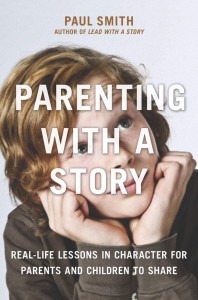An insightful Chinese proverb explains, “Tell me, I’ll forget. Show me, I’ll remember. Involve me, I’ll understand.” That’s the insight behind this technique to go beyond just storytelling, to actually creating events in people’s lives that they will remember for a long time, and probably tell stories about. Here’s an example:
New pay and promotion policy
IN 1997, I WAS THE finance manager of one of P&G’s West Coast manufacturing plants. Halfway through my assignment, my boss (the plant manager) moved to a new role, which meant I got a new boss. His name was Joe Lovato.
One day during his second month as the new plant manager, right before quitting time, Joe sent his leadership team a memo, with a note attached. The note read, “Tomorrow morning at our leadership team meeting, I’ll be telling you about a new pay and promotion policy I’ll be implementing for all the managers at this plant. But I wanted to give each of you a chance to think about it overnight first. Talk to you in the morning. Joe.”
We all read the memo before going home. Essentially, what it said was this: Unless you work in one of the three most important departments in the plant—production, packing, or shipping—you will not be eligible for any promotions or pay raises. There were probably three managers on the leadership team who didn’t mind this new policy —the heads of the production, packing, and shipping departments. But the rest of us were livid! We went home that night in a rightfully foul mood, grumbled to our spouses, yelled at our kids, and didn’t get much sleep because we were busy thinking of all the nasty things we were going to say to Joe Lovato the next morning.
When the morning came, and the meeting started, we lit into Joe Lovato like you wouldn’t believe. We belched out all the reasons why his idea was foolish—“This isn’t fair! We hire people from all over the world to come here . . . we benchmark salaries nationally . . . this will make it impossible to get good managers to work at this plant . . . who do you think you are to go against the corporate policy! And besides,” we told him, “You don’t even have the authority to make such a decision!”
He let us vent for about 20 minutes. And then he said, “Okay, you can stop worrying now. I never intended to implement that policy anyway. I just wanted you to know what it feels like, for one night, to live under the same pay and promotion policy you implemented for the non-management personnel at this plant before I arrived.” Awkward silence.
He was right. We had. We did so because working in production, packing, and shipping was the hardest work in the plant. The other jobs were cushy in comparison. Desk jobs. Air-conditioned jobs. Since company policy didn’t allow for significantly higher pay for the hard jobs, we resorted to this tactic to encourage people to want to stay in the hard jobs. And if they did go take one of the desk jobs, this would incentivize them to come back to the hard-on-your-feet work in a couple of years. It made sense at the time.
Joe could have simply brought up the promotion policy in the staff meeting and told us he didn’t understand it, or didn’t think it was fair, or wanted to change it. But then we would have just calmly told him all the very good reasons why we put that policy in place to begin with. But after making us live with that policy for one night—as if it applied to us —and then letting us argue with him about why it was a bad idea for us, it was much harder to justify that it was okay for the rest of the employees.
Joe didn’t just tell us a good story. He made us part of it. He let us, his audience, play an active role as the story unfolded around us. That’s what made it amazingly effective. Anytime you can actually bring your audience into the story, instead of just telling them a story, it magnifies the effectiveness of your message many times over. It takes the power of storytelling to an entirely new level.
Of all the elements of storytelling discussed in this book, this is by far the most powerful. But you have to wield that power carefully. Used unwisely it can be dangerous, and even counterproductive. For example, in the case of Joe Lovato, there may be a few of those leadership team members today who are still upset with him for pulling that little ruse on us, even though it only lasted for about 15 hours.
My conclusion
This is an admittedly extreme example. Executed this way, it’s probably the kind of tactic you can get away with only two or three times in a career. But if there’s something that’s vitally important to you or your audience, it might warrant going to this length. Joe is passionate about people and making sure they’re treated fairly. To him, this was one of those times it was warranted.
What if that’s not possible? How do you know if your lesson is worthy of the stronger measure, as it was in the Joe Lovato story? Here’s the acid test: Imagine you were the audience and it was happening to you. After it was over, would you thank your instructor for teaching you such a valuable lesson? Or would you resent them for it? If the lesson is important enough to your audience, they’ll thank you for it. If it’s only important to you, they certainly won’t. Not every message you have will pass the test. And you may not be able to construct the alternative like Jim Owen did. So, is there a way to put the audience into the story with this same impact, but without any false pretense?
Not every message you have will pass the test. And you may not be able to construct the alternative like Jim Owen did. So, is there a way to put the audience into the story with this same impact, but without any false pretense? Fortunately, there is. Here’s an example.
Clean Desk Policy
About once a month, one U.S. company’s regional sales office holds a meeting. Everyone gathers in the largest conference room to listen to leadership team members comment on the state of the business, celebrate key milestones, and recognize great work. It’s generally a great pep rally. One month, the human resources manager took the microphone. With a celebratory tone in her voice, she said, “Did you know next month our West Coast team will be launching the biggest initiative in 10 years? It’s a new technology that boosts product performance by 10 percent! A huge breakthrough in the category.” Cheers and applause followed.
She continued, “Did you know we got extra money from the corporate office, and in three weeks we’ll be doubling our price discounts to help deliver our sales forecast?” More cheers and applause.
“Did you know we’ve canceled some of our advertising scheduled for the Fall, and are using the money instead to send samples of the new and improved product to customers all over the country?” Again, cheers and applause.
Several more such rhetorical questions followed, along with the expected hurrahs from the team. After the applause died down, the HR manager answered her own rhetorical questions as follows: “Well I didn’t know any of that until last night at 10 o’clock when I walked around our open office space and read some of the memos left out on people’s desks, printers, and fax machines.”
The celebratory mood in the room immediately vanished into an awkward silence. She continued, “What would happen if those memos fell into the hands of our competitors? Do you think they would do something to ensure our efforts failed?” Sheepish, guilty nods from the audience. “We have a ‘clean desk’ policy for a reason. Please do your part to keep our competitive secrets just that—secret.”
The HR manager could have just gotten up and reminded everyone (for the umpteenth time) about the company’s “clean desk” policy. But what she did was far more effective. She wrote the audience into the story. And she did so without calling out anyone in particular.
Violations of the clean desk policy dropped dramatically the next day.
The lesson
In addition to avoiding false pretenses, how did that story deliver the impact without offending the audience? Answer: There is safety in numbers. Nobody got singled out. In the Joe Lovato story, three leadership team members weren’t affected by the “new” policy. The remaining five were. That lack of equal treatment can lead to resentment. Unless you’re trying to make a point about how it feels to be treated unfairly, it’s better to avoid the situation entirely.
[You can find this and over 100 other inspiring leadership stories in my book, Lead with a Story.]
—
 Paul Smith is one of the world’s leading experts on business storytelling. He’s a keynote speaker, storytelling coach, and bestselling author of the books Lead with a Story and Parenting with a Story.
Paul Smith is one of the world’s leading experts on business storytelling. He’s a keynote speaker, storytelling coach, and bestselling author of the books Lead with a Story and Parenting with a Story.

 Connect with him via email here.
Connect with him via email here.
Follow him on Facebook, LinkedIn, Twitter.
Sign up for his newsletter here to get one new story a week delivered to your inbox.
